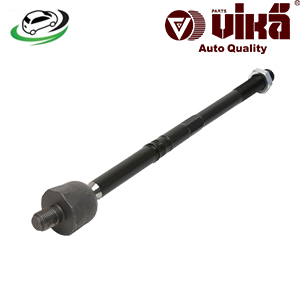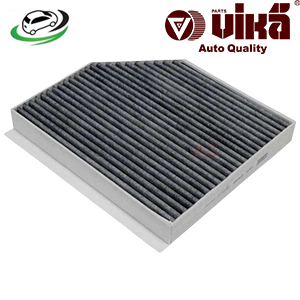-17%
Hood Gas Spring Shock Lift Strut VW Golf Mk5/Jetta III 1K0823359A
The hood gas spring shock lift strut, commonly referred to as the hood strut or gas lift support, is a crucial component in a vehicle’s hood (bonnet) system. It facilitates the smooth operation of the hood by assisting in lifting, holding, and lowering it. Understanding the function, types, benefits, and maintenance of hood gas spring shock lift struts can help you ensure their effective operation and extend their service life.
Function of the Hood Gas Spring Shock Lift Strut
- Support and Lifting:
- Primary Role: The hood gas spring shock lift strut assists in lifting the hood to an open position, providing the necessary force to overcome the weight of the hood.
- Mechanism: By using gas pressure, the strut aids in raising the hood smoothly and reducing the effort required from the user.
- Holding the Hood Open:
- Primary Role: Once the hood is lifted, the gas strut holds it in an open position, preventing it from falling or closing unexpectedly.
- Mechanism: The strut’s internal pressure keeps the hood in place, ensuring safe access to the engine compartment for maintenance and repairs.
- Controlled Lowering:
- Primary Role: When lowering the hood, the gas strut provides controlled resistance, allowing the hood to descend smoothly and gently.
- Mechanism: The strut’s damping ability prevents the hood from dropping too quickly, reducing the risk of damage or injury.
Types of Hood Gas Spring Shock Lift Struts
- Gas-Charged Struts:
- Description: These struts are filled with compressed gas, typically nitrogen, which provides the force required for lifting and holding the hood.
- Advantages: Gas-charged struts offer consistent performance and durability, with less maintenance required compared to hydraulic struts.
- Disadvantages: Over time, gas can leak from the strut, leading to reduced effectiveness.
- Hydraulic Struts:
- Description: Hydraulic struts use fluid to create pressure for lifting and damping.
- Advantages: Hydraulic struts provide smooth operation and precise control.
- Disadvantages: They may require more maintenance due to potential fluid leaks or degradation.
- Combination Struts:
- Description: These struts combine both gas and hydraulic components to offer a balance of lifting force and controlled damping.
- Advantages: They provide a mix of benefits from both gas and hydraulic struts, offering durability and smooth operation.
- Disadvantages: Combination struts can be more complex and costly.
Benefits of Hood Gas Spring Shock Lift Struts
- Ease of Operation:
- Benefit: Gas struts make it easier to lift, hold, and lower the hood with minimal effort.
- Explanation: The assistance provided by the strut reduces the physical strain on the user, making it more convenient to access the engine compartment.
- Enhanced Safety:
- Benefit: By securely holding the hood open, gas struts prevent accidental closure, reducing the risk of injury or damage.
- Explanation: The strut ensures that the hood remains stable while being accessed, enhancing safety during maintenance.
- Improved Functionality:
- Benefit: Properly functioning gas struts provide a smooth and controlled operation for the hood.
- Explanation: The ability to lift and lower the hood smoothly contributes to overall vehicle functionality and user experience.
- Durability and Longevity:
- Benefit: Quality gas struts are designed to withstand repeated use and harsh environmental conditions.
- Explanation: Durable struts offer long-term performance and reliability, reducing the need for frequent replacements.
- Reduced Wear and Tear:
- Benefit: Gas struts help distribute the weight of the hood evenly, reducing stress on the hood hinges and latch mechanisms.
- Explanation: Proper distribution of weight extends the lifespan of these components and prevents premature wear.
- Aesthetics:
- Benefit: Gas struts are often designed to be sleek and unobtrusive, enhancing the overall appearance of the engine bay.
- Explanation: Their discreet design adds to the vehicle’s aesthetics without the need for bulky support rods.
Symptoms of a Faulty Hood Gas Spring Shock Lift Strut
- Difficulty in Lifting or Holding the Hood:
- Symptom: The hood may be difficult to lift or may not stay open securely.
- Cause: A failing gas strut may lose its ability to provide adequate lifting force.
- Consequence: Inadequate support can make accessing the engine compartment difficult and unsafe.
- Hood Falls or Drops:
- Symptom: The hood may suddenly fall or drop while it is open.
- Cause: A worn-out or failing gas strut can no longer hold the hood in place.
- Consequence: This poses a safety risk and can potentially cause damage to the hood or other components.
- Visible Leaks or Oil Residue:
- Symptom: Oil or fluid leaks around the strut or on the hood.
- Cause: Leaking hydraulic fluid or gas indicates that the strut is damaged or worn out.
- Consequence: Loss of fluid or gas affects the strut’s performance and requires replacement.
- Uneven or Jerky Movement:
- Symptom: The hood may open or close unevenly or jerkily.
- Cause: A faulty strut can cause inconsistent movement due to internal damage or wear.
- Consequence: Uneven movement can affect the smooth operation of the hood.
- Strut Damage:
- Symptom: Visible physical damage, such as dents, bends, or corrosion, on the gas strut.
- Cause: Physical damage can impair the performance of the strut.
- Consequence: Damage to the strut necessitates replacement to restore proper function.
Maintenance and Replacement Tips
- Regular Inspection:
- Tip: Periodically inspect the gas struts for signs of wear, damage, or leaks. Check the hood’s operation and listen for any unusual noises.
- Frequency: Inspections should be part of routine vehicle maintenance, especially before long trips or during regular service intervals.
- Timely Replacement:
- Tip: Replace faulty gas struts as soon as symptoms are noticed. Delaying replacement can lead to further damage and safety risks.
- Indication: Replace struts immediately if the hood shows difficulty in lifting, holding, or lowering.
- Choose Quality Parts:
- Tip: Use high-quality gas struts that match the manufacturer’s specifications for your vehicle. Quality parts ensure better performance and longevity.
- Reason: Ensuring compatibility and quality helps maintain optimal performance and reduces the need for frequent replacements.
- Professional Installation:
- Tip: Have gas struts installed by a professional mechanic to ensure proper fit and function. Incorrect installation can affect the performance and safety of the struts.
- Reason: Professional installation ensures that the struts are installed correctly and function as intended.
- Keep the Area Clean:
- Tip: Keep the gas struts and surrounding areas clean to prevent dirt and debris from causing damage.
- Reason: Regular cleaning helps maintain the struts’ performance and prevents premature wear.
- Avoid Overloading:
- Tip: Do not place excessive weight or pressure on the hood, as this can stress the gas struts and lead to premature wear.
- Reason: Proper handling of the hood prevents unnecessary strain on the struts and extends their service life.
Follow us on Facebook for more parts.



